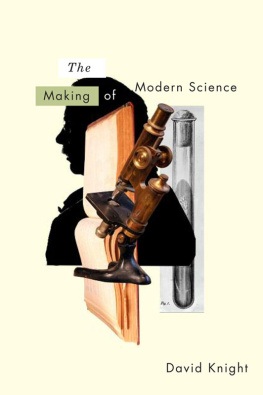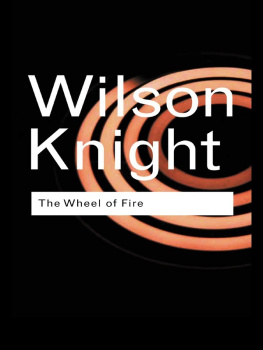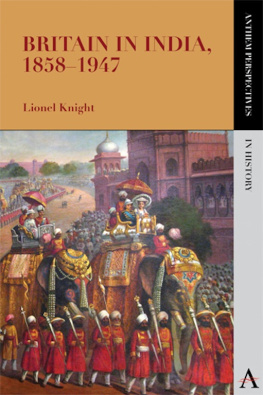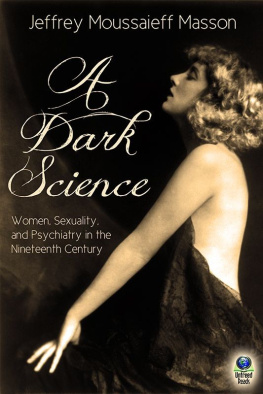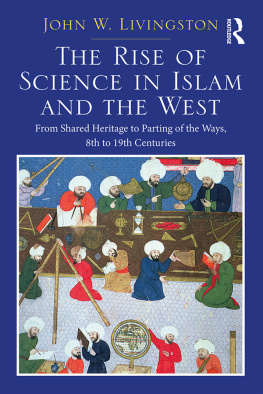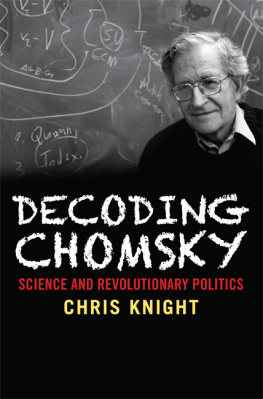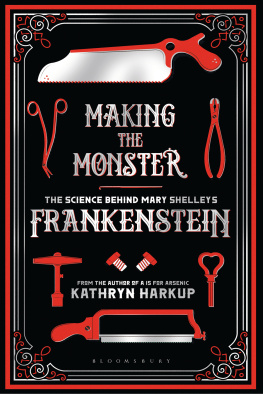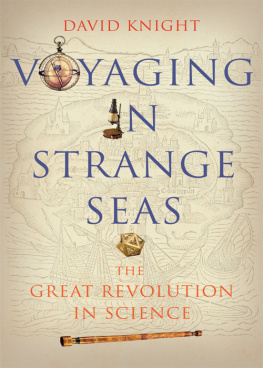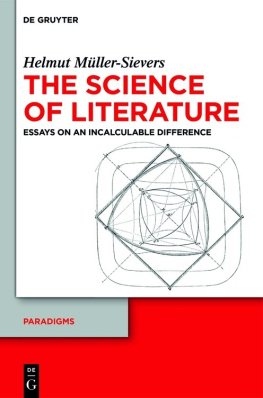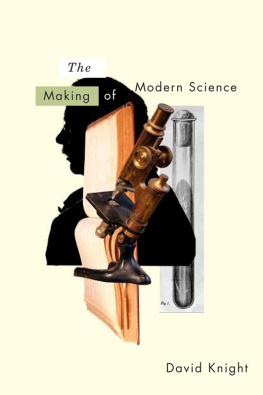Knight - Science in the 19th century the making of modern science
Here you can read online Knight - Science in the 19th century the making of modern science full text of the book (entire story) in english for free. Download pdf and epub, get meaning, cover and reviews about this ebook. City: Cambridge, year: 2009, publisher: Wiley;Polity, genre: Art. Description of the work, (preface) as well as reviews are available. Best literature library LitArk.com created for fans of good reading and offers a wide selection of genres:
Romance novel
Science fiction
Adventure
Detective
Science
History
Home and family
Prose
Art
Politics
Computer
Non-fiction
Religion
Business
Children
Humor
Choose a favorite category and find really read worthwhile books. Enjoy immersion in the world of imagination, feel the emotions of the characters or learn something new for yourself, make an fascinating discovery.
Science in the 19th century the making of modern science: summary, description and annotation
We offer to read an annotation, description, summary or preface (depends on what the author of the book "Science in the 19th century the making of modern science" wrote himself). If you haven't found the necessary information about the book — write in the comments, we will try to find it.
Knight: author's other books
Who wrote Science in the 19th century the making of modern science? Find out the surname, the name of the author of the book and a list of all author's works by series.
Science in the 19th century the making of modern science — read online for free the complete book (whole text) full work
Below is the text of the book, divided by pages. System saving the place of the last page read, allows you to conveniently read the book "Science in the 19th century the making of modern science" online for free, without having to search again every time where you left off. Put a bookmark, and you can go to the page where you finished reading at any time.
Font size:
Interval:
Bookmark:
THE MAKING OF MODERN SCIENCE
THE MAKING OF MODERN SCIENCE
SCIENCE, TECHNOLOGY, MEDICINE AND MODERNITY: 17891914
DAVID KNIGHT
polity
Copyright David Knight 2009
The right of David Knight to be identied as Author of this Work has been asserted in accordance with the UK Copyright, Designs and Patents Act 1988.
First published in 2009 by Polity Press
Polity Press
65 Bridge Street
Cambridge CB2 1UR, UK
Polity Press
350 Main Street
Malden, MA 02148, USA
All rights reserved. Except for the quotation of short passages for the purpose of criticism and review, no part of this publication may be reproduced, stored in a retrieval system, or transmitted, in any form or by any means, electronic, mechanical, photocopying, recording or otherwise, without the prior permission of the publisher.
ISBN-13: 978-0-7456-5799-8
A catalogue record for this book is available from the British Library.
Typeset in 10.5 on 14 pt Adobe Janson
by Servis Filmsetting Ltd, Stockport, Cheshire
Printed and bound by MPG Books Group, UK
The publisher has used its best endeavours to ensure that the URLs for external websites referred to in this book are correct and active at the time of going to press. However, the publisher has no responsibility for the websites and can make no guarantee that a site will remain live or that the content is or will remain appropriate.
Every effort has been made to trace all copyright holders, but if any have been inadvertently overlooked the publisher will be pleased to include any necessary credits in any subsequent reprint or edition.
For further information on Polity, visit our website: www.politybooks.com
CONTENTS
ILLUSTRATIONS
PREFACE: THE AGE OF SCIENCE
Of all the inventions of the nineteenth century, the label scientist was one of the most striking. In 1789 there had been natural philosophers and natural historians, and at a slightly less gentlemanly level, chemists, anatomists and instrument makers. Their childish curiosity continued into adulthood, when solving problems and nding explanations could be a leisure activity, maybe sociable. But science was, as Humphry Davy (17781829) put it to the young Michael Faraday (17911867) in 1812, a harsh mistress from the pecuniary point of view. Outside medicine, where scientic knowledge might help as a back-up to the all-important bedside manner and clinical experience, science was a vocation or hobby rather than a job or profession. The word scientist was invented in 1833: the thing came later.
Science required skills: mechanical, mathematical, manual, logical, observational and organizational ability were in various degrees necessary. Medicine and mathematics were taught in universities, but in 1789 there were no degrees in science (or indeed in modern history, or modern languages and literature): Greek and Latin classics formed a liberal and traditional education for mandarins, and for the scholarship boys who would become clergy, tutors, judges and schoolmasters. Engineers and the majority of medical men learned on the job, as apprentices; and science similarly might best be learned, as by Faraday with Davy, in a kind of informal apprenticeship. There were in France, Prussia and Russia a few salaried posts to compete for in Academies of Sciences, but generally patronage was the key in 1789 usually from the nobility and gentry, and by 1914 from but for most, unless they were independently well-off like Charles Darwin (180982), some kind of profession was necessary to keep the wolf from the door, and science had to be a spare-time activity.
The science student was invented in the 1790s with the founding of the cole Polytechnique in revolutionary France, entered through competitive examination, with formal courses in science and engineering taught by academicians active in research. But the graduate student came from Germany, where Justus von Liebig (180373) at the small University of Giessen opened a teaching laboratory in the 1820s and began PhD programmes in chemistry the rst notable research school.
Science is thus a practical, intellectual and social activity that became momentous during the nineteenth century. We must therefore be aware not just of geniuses and their discoveries but of scientic societies: open, learned, professional, formal or informal (maybe just networks), and in all these categories cutting across lines of class, region and nation, and increasingly specialized. Science was both public knowledge and meritocratic, a route to social mobility and a vehicle of modernity. Scientic education might be critical, with more or less conscious consideration of scientic method, but often it was and is dogmatic, perhaps necessarily so, to prevent todays students falling into yesterdays errors.situations, controlled conditions as in a laboratory, models and general laws. Scientists wrestle with questions difcult to answer, and very occasionally with questions difcult to ask, but they hope for answers that are denite or have denite probabilities. This seems very different from ethical or political questions. The supposed two cultures and science wars that set science against other ways of thinking, and the scientism that supposes scientic methods are the only valid ones in any eld, emphasize this difference.
In the nineteenth century science made a huge impact on the public, or publics, as it impinged on food production, transport, communications, fashion, art, literature, politics, religion, and even on national prestige and condence. Although many were religious believers, scientists became part of a clerisy, a secular intellectual elite taking over the roles of prophet and instructor previously played by the clergy.
Popular science was not always what academicians would have wanted: phrenology, mesmerism and animal magnetism were more popular than the austere and exact sciences (and indeed the last of them remains popular, though the theory was exploded by Benjamin Franklin, 170690). We must also not forget, in our enthusiasm for thoughts never thought before and sights never seen, those at the receiving end of science, who paid the price for its progress. Traditional values and ways of life were lost. New explosives such as gun-cotton blew up and killed people making it, chemical works poisoned people and animals living nearby, ofcials classied people ); but one reason for the word scientist displacing man of science was that by 1900 women were at last able to break in and be recognized.
The nineteenth century was an age of technological progress, of empire-building, of new nations, new specialisms and professions, new possibilities, and new understanding of the natural world. In a brief telling of this age of science, much must be left out. Science has had its context as well as its content; I have tried here to preserve a balance. In looking at science, I believe that we can easily tip too much towards the content, the theories, experiments and creative individuals, and away from the social and historical context the ethical and religious beliefs, the educational systems, the societies and clubs, the publishers, the popularizers and the publics. Accordingly, while I have tried to do justice to the intellectual aspects of science, some would have wanted more about evolution and conservation of energy, those great generalizations that brought a new coherence to science in the 1850s. Evolution and energy do indeed permeate the story, but I have tried to place them in contexts of progress, religious doubt, ethical debates, scientists claims for status and respect, and improvements to dyes, lighting, transport, explosives and battleships. In the early part of the nineteenth century, science lagged behind technology, and men of science sought to explain how inventions worked. But science then got ahead, and applied science became the key to new industries. In the later years of the century, pure science was distinguished from applied: but really it is hopeless to try to separate science, technology and medicine all aspects of one intellectual, practical and social activity that we are concerned with here. Interpreting nature involved thinking about what to do with that knowledge. This is well exemplied in chemistry, the science most studied in the nineteenth century, vital in medicine and in industry, the source of wealth and power, which gave us atomic theory, molecular models, an understanding of matter and its relations to electricity, and photography. I have tried to give chemistry its due in the story.
Next pageFont size:
Interval:
Bookmark:
Similar books «Science in the 19th century the making of modern science»
Look at similar books to Science in the 19th century the making of modern science. We have selected literature similar in name and meaning in the hope of providing readers with more options to find new, interesting, not yet read works.
Discussion, reviews of the book Science in the 19th century the making of modern science and just readers' own opinions. Leave your comments, write what you think about the work, its meaning or the main characters. Specify what exactly you liked and what you didn't like, and why you think so.

